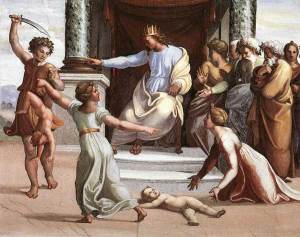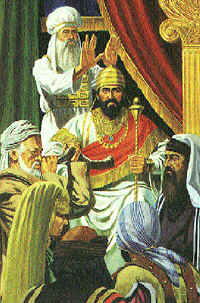 The English title, Ecclesiastes, comes from the Septuagint. The Greek word means “preacher” and translates the Hebrew title, which apparently referred to the office of a preacher or teacher. It is derived from the Hebrew word Qohelet, meaning “to assemble.”
The English title, Ecclesiastes, comes from the Septuagint. The Greek word means “preacher” and translates the Hebrew title, which apparently referred to the office of a preacher or teacher. It is derived from the Hebrew word Qohelet, meaning “to assemble.”
The Book of Ecclesiastes is an advanced wisdom text intended for adults. The Hebrews did not include it in the wisdom works used to educate their children because of its contents.
The traditional view of authorship is that King Solomon wrote the book late in his life, around 940 BC. However, many scholars, perhaps the majority, believe that Ecclesiastes was not written by Solomon, but by an anonymous author as late as 200 BC.
Biblical scholar Tom Howe summarizes the theme of Ecclesiastes:
Although the tone of the book as a whole seems to be pessimistic, Qohelet is not a pessimist. Rather, his goal is to demonstrate that life is meaningless, unless one lives it in the fear of God, keeping His commandments and enjoying life as a gift from Him. Ultimately, Qohelet is urging the reader not to trust in anything in this life to provide meaning and value. Rather, one should trust only and always in God, and live life before Him.
In chapter 2, verses 1-11, Solomon writes about his experiments with pleasure. His goal was to see if the meaning of life consisted in earthly pleasures. Solomon attempted to laugh as much as possible, but he didn’t find meaning in laughter. He drank wine and became intoxicated, but didn’t find meaning in that either.
He built houses, gardens, vineyards, parks, water reservoirs. He bought numerous slaves and livestock. He amassed gold and silver. He brought hundreds of beautiful women into his household so that he could have sex with them. He reports that he denied himself no pleasure that he desired.
After denying himself no pleasure, did he finally find the meaning of life? He answers, “Yet when I surveyed all that my hands had done and what I had toiled to achieve, everything was meaningless, a chasing after the wind; nothing was gained under the sun.”
Solomon, it should be noted, is not saying that laughter, wine, building projects, wealth, etc., are all bad. There is a time and place for all these things. The point is that none of them can provide a person a meaningful life by themselves. Something is missing.
In verses 18-26, Solomon then considers his labors from another perspective. What would become of all the wealth that he had amassed, all of the building projects, all of the work that he had accomplished during his life?
The truth is that everything Solomon built will be left to his children, to those who live after he dies. His children, who did not work for what he gives them, may be fools who squander all of the work which Solomon completed. Three times in these verses Solomon laments that “this too is meaningless.” If all of a man’s labor merely gets passed on to those who had nothing to do with it, then what is the point of all this labor? What is the point in working hard in this life?
In verses 24-26, we get to a central theme of Ecclesiastes. Solomon’s answer to the question of the meaning of life is the following:
“A man can do nothing better than to eat and drink and find satisfaction in his work. This too, I see, is from the hand of God, for without him, who can eat or find enjoyment?”
Is Solomon teaching that we should all just eat, drink, and be merry? Is that all there is to life? Not at all. Duane A. Garrett, in Proverbs, Ecclesiastes, Song of Songs (New American Commentary), writes:
We should not understand ‘nothing is better than’ in a rigidly literal sense, as if the Teacher were saying that enjoyment of food and possessions is the goal of life. In context he is talking about how one should view life with respect to labor and the fruit of labor. He is not, therefore, negating the worth of higher values. But he insists that people should learn how to enjoy the return they get on their labor. Indeed, the ability to enjoy and use the good things of life (i.e., material things) is itself a gift of God. Those who belong to God should above all others have a capacity to enjoy life.
In chapter 3, verses 1-11, Solomon teaches his readers that there is a time for everything. The verses move back and forth between desirable and undesirable aspects of life. They are meant to represent the totality of human existence.
Duane Garrett expresses the meaning of these verses:
Life is composed of joy and sorrow, building and destroying, and living and dying. Each comes at the proper time. This reminds us that we are creatures of time and not yet able to partake of the joys of eternity. No one can be happy who has not come to grips with the reality that life is full of changes and sorrows as well as continuity and joy. We must accept that we are mortal and governed by time.
Donald R. Glenn, in The Bible Knowledge Commentary (Old Testament:), adds:
(1) Solomon observed that God … has made everything beautiful (or, ‘appropriate’; the same word is trans. ‘proper’ in 5:18) in its time, that is, God in His providential plans and control has an appropriate time for every activity. (2) Solomon observed that God has put eternity in the hearts of men. People have a longing or desire to know the extratemporal significance of themselves and their deeds or activities. (3) Solomon added that people cannot know the works of God … from beginning to end, that is, they cannot know the sovereign, eternal plan of God. Human labor is without profit because people are ignorant of God’s eternal plan, the basis by which He evaluates the appropriateness and eternal significance of all their activities. Because of this ignorance there is an uncertainty and latent temporality to the value of all one’s labor.
So how is mankind supposed to cope with the tension of a temporal life and a desire for immortality?
Verses 12-13 repeat the theme of the book: “I know that there is nothing better for men than to be happy and do good while they live. That everyone may eat and drink, and find satisfaction in all his toil—this is the gift of God.”
 Proverbs 3 begins by reminding the reader that the words of wisdom contained in these proverbs will prolong life and yield prosperity. In addition, the reader is commanded to live a life characterized by love and faithfulness.
Proverbs 3 begins by reminding the reader that the words of wisdom contained in these proverbs will prolong life and yield prosperity. In addition, the reader is commanded to live a life characterized by love and faithfulness. The books of 1 and 2 Kings were originally a single work, but were separated into two parts when they were translated into the Greek New Testament (the Septuagint). The Septuagint also combined Samuel and Kings into a four-part history of the monarchy of Israel (First, Second, Third, Fourth Book of Kingdoms).
The books of 1 and 2 Kings were originally a single work, but were separated into two parts when they were translated into the Greek New Testament (the Septuagint). The Septuagint also combined Samuel and Kings into a four-part history of the monarchy of Israel (First, Second, Third, Fourth Book of Kingdoms). 1 and 2 Chronicles were originally a single work that was separated into two books when it was translated into the Greek Septuagint. The Chronicles was written to the Jewish people after they returned from Babylonian exile in the 6th century BC. Jewish tradition holds that Ezra was the author of Chronicles, but scholars are divided on the issue.
1 and 2 Chronicles were originally a single work that was separated into two books when it was translated into the Greek Septuagint. The Chronicles was written to the Jewish people after they returned from Babylonian exile in the 6th century BC. Jewish tradition holds that Ezra was the author of Chronicles, but scholars are divided on the issue.